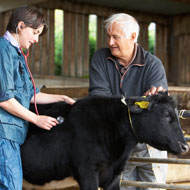
MPs debate recommendations of the O’Neill report
Antibiotic usage in agriculture is falling faster than in human medicine, according to junior health minister Nicola Blackwood.
Ms Blackwood made the comments during an MPs debate on the recommendations of the O’Neill report on antimicrobial resistance.
During the debate, she said that between 2014 and 2015, the total of consumption of antibiotics by humans fell by 4.3 per cent while sales of antibiotics for food-producing animals dropped by 10 per cent.
She also stressed the need for the Department of Health to work closely with the Veterinary Medicines Directorate to reduce the use of antimicrobials in livestock and in fish farmed for food.
“Between 2014 and 2015, we saw a drop of 10 per cent in sales of antibiotic for food-producing animals, but we know that we need to go further. So we are now in the process of setting sector-specific targets to ensure that we achieve our ambition of 50 milligrammes per kilogramme weight of animal by 2018,' she said.
“[AMR] is truly a global security challenge, of a scale that requires long-term political leadership to drive through the international change, the up-front investment to break the cycle of market failure in drugs development and the urgent action needed to improve diagnostics and cut inappropriate prescribing, and to ensure that patients complete their courses of medicines in an appropriate way.”
Most of the debate that took place in the House of Commons this week centred on human medicine - including the inappropriate prescribing of antibiotics. But some MPs focussed on agriculture, with conservative MP Theresa Villiers calling for action on intensive farming.
“It is vital we heed the O’Neill review’s recommendation that antimicrobial use in farming must reduce if we are to address the frightening consequences that he is outlining,” she said. “In particular, we need to move away from intensive farming, which is reliant on the prophylactic use of antimicrobials.”
Former Shadow Defra Secretary Kerry McCarthy added: “It is encouraging that DEFRA has now—after being rather complacent about the routine use of antibiotics in farming, it has to be said—committed to a 20 per cent reduction by 2018, in line with the O’Neill review’s recommendations, but more action is needed."



 The Federation of Independent Veterinary Practices (FIVP) has announced a third season of its podcast, Practice Matters.
The Federation of Independent Veterinary Practices (FIVP) has announced a third season of its podcast, Practice Matters.